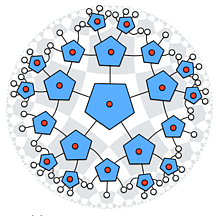 Nearly 200 scientists and theorists from around the world will descend on the University of Maryland campus next week for the 4th International Conference on Quantum Error Correction (QEC17), the world’s premier scientific meeting focused on the protection of quantum computers from their hostile surroundings.
Nearly 200 scientists and theorists from around the world will descend on the University of Maryland campus next week for the 4th International Conference on Quantum Error Correction (QEC17), the world’s premier scientific meeting focused on the protection of quantum computers from their hostile surroundings.
This year’s conference, from Sept. 11–15, is organized by researchers from the Joint Center for Quantum Information and Computer Science (QuICS) and Georgia Tech.
Quantum error correction is a suite of techniques for maintaining stable qubits, the quantum computer analog of the bits in ordinary computers. Similar to the way that conventional error correction defends against corrupted bits, quantum error correction protects qubits by deploying redundancy: If you want to defend one qubit, you should spread its information across many qubits.
But after more than two decades of theoretical progress in the field—from the first realization that fragile qubits might be able to withstand noise, to detailed modern estimates of the bare hardware required, to implement full-blown error-corrected quantum computation—the buzz ahead of QEC17 is that the theory is finally being put into practice.
“This year marks a turning point in the field, with several companies and large groups making a push towards sufficiently large quantum computers to enable testing quantum error correction in the lab,” says Jacob Taylor, the co-director of QuICS who helped organize this year’s conference.
Several presentations at QEC17 touch on these laboratory efforts. Norbert Linke, a postdoctoral researcher at the Joint Quantum Institute (JQI) at UMD, will present recent results demonstrating quantum error detection—a simpler step on the road to full error correction—on a qubit split across four trapped atomic ions. Robert Schoelkopf of Yale will discuss progress toward error correction on a different physical platform—superconducting qubits—and John Martinis and Austin Fowler will describe Google’s progress toward error correction experiments on a device that supports nearly 50 superconducting qubits.
In addition to the practical progress toward quantum error correction, the field’s maturity and reach will be on display at QEC17.
“Quantum error correction is also branching out to answer questions about quantum gravity and other areas outside of quantum information science,” says Ken Brown of Georgia Tech, another co-organizer of the conference.
Recently arrived QuICS Fellow Brian Swingle will speak about the relationship between quantum error correction and wormholes, and Beni Yoshida of the Perimeter Institute for Theoretical Physics will draw connections to the radiation emitted by black holes.
John Preskill of Caltech, an early figure in the field, will close out the conference on Sept. 15 with a talk that will address several major open problems in quantum error correction in light of the results presented at QEC17.
—Story by Chris Cesare
About QuICS: QuICS is a partnership between the University of Maryland and the National Institute of Standards and Technology. Faculty and students in QuICS receive technical and administrative support from the University of Maryland Institute for Advanced Computer Studies.